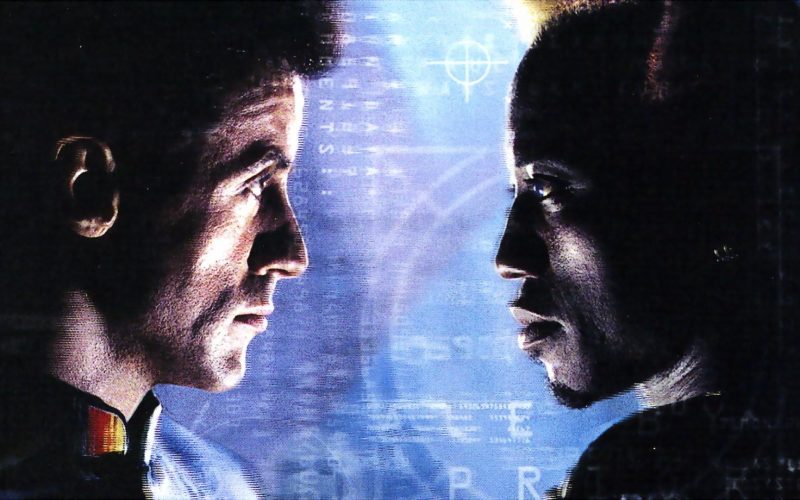Demolition Man (1993).
25 years on, Sylvester Stallone’s futuristic action/sci-fi romp seems more relevant than ever.
The start of the 1990’s were a strange and unfamiliar time for Sylvester Stallone. He’d seen his most established character seemingly move into retirement with Rocky V failing to garner either critical praise or financial success and his other best known alter ego, John Rambo, had recently appeared in a third outing that was generally regarded as the weakest outing of the then trilogy of films. As well as these iconic stalwarts within his filmography, films such as Cobra and Over The Top had failed to match the expectations of both cinemagoers and the studios alike.
Of course Stallone would later bring both of these iconic characters out of storage for two films that both stack up well against the originals in each respective franchise but in 1993 that was a long way off. Stallone was now seemingly a relic of a more violent and uncivilised past and many suggested that his career needed to be put on ice.
So by way of that none too subtle segue, we move on to perhaps Stallone’s most underrated character, John Spartan.
His 1993 action film, Demolition Man is a film that when brought up in conversation will often bring back a positive response from a particular generation. It remains an overlooked late entry into the action genre of the ‘80s, of which Stallone was one of the two main players.
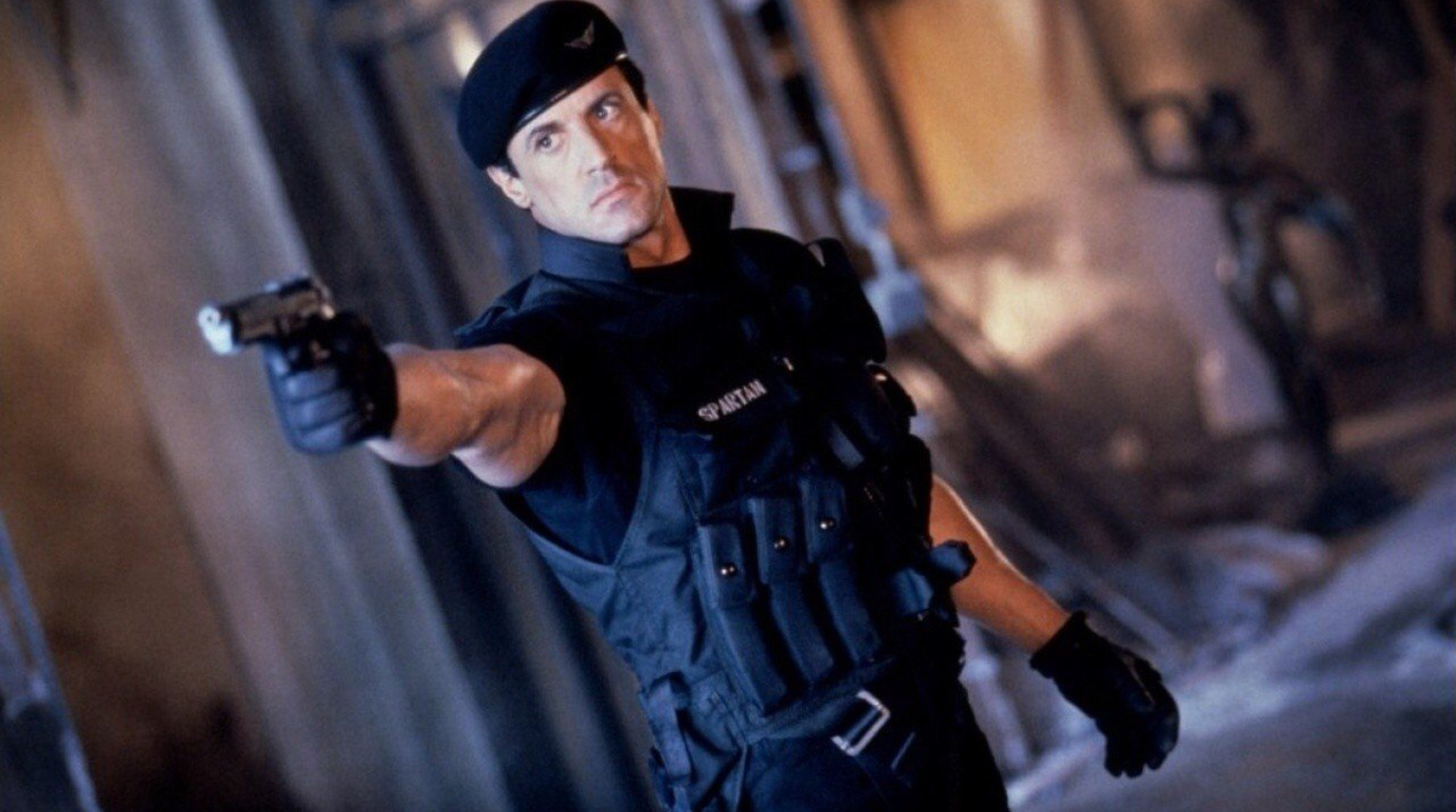
The film begins in the then future Los Angeles of 1996. John Spartan, a rule bending cop who leaves a trail of destruction in his wake and goes by the nickname The Demolition Man, is hot on the trail of Simon Phoenix (Wesley Snipes) who has taken hostages in a large warehouse complex in war-torn downtown Los Angeles. Both men have supposedly been involved in a deadly game of cat and mouse for years, with Stallone’s tough guy cop determined to bring down the almost cartoonish crime boss. After a brief head to head it becomes apparent that Phoenix has killed the hostages, with the only clear result being that he can frame Spartan as being responsible for their deaths.
As a result, both men are found to be responsible and find themselves sentenced to a cryogenic prison sentence, an icy suspended animation, and are to remain there for an undisclosed but supposedly long period of time.
By way of a quick 36 year time jump we find ourselves in the year 2032 with Phoenix being thawed out for what appears to be a routine parole hearing whereby he quickly effects his escape. The cops of San Angeles (formed after a massive earthquake resulted in the merging of Los Angeles, San Diego and Santa Barbara) are ill equipped to deal with this violent relic of their past and need help. As a result they to quickly pop John Spartan on defrost. As Spartan himself later quips “Sometimes you need to send a maniac to catch one”.
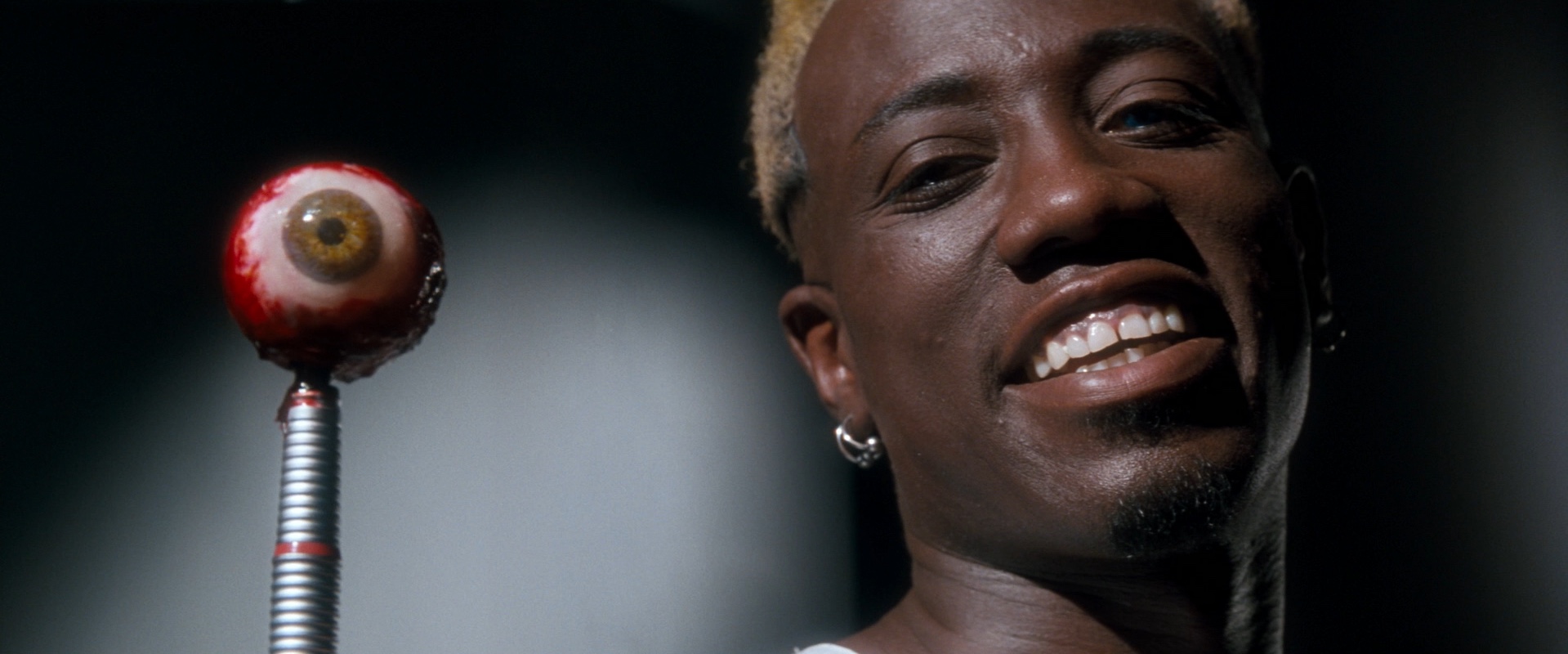
The now thawed out John Spartan is introduced to a world that is completely alien to him. It’s a vanilla, saccharine, sanitised version of the future where violence in any form no longer exists and using bad language results in an instant fine. Anything that even remotely works against the cultural cleanliness of this purified future, such as rock music or fast food, even sex, has been outlawed.
Paired up with the overly enthusiastic SAPD officer Lenina Huxley (Sandra Bullock) to help guide him, he sets off to track down his nemesis, Phoenix who is having an absolute blast causing chaos in this neutered future. Spartan is almost immediately at a disadvantage in his pursuit as he later finds out that during ones time in cryogenic prison, you are essentially conditioned, upgraded with new skills to aid the rehabilitation process. Phoenix appears to have benefited from being taught extensive fighting skills and warfare tactics, whereas Spartan has had far less useful conditioning but can now knit a mean sweater.
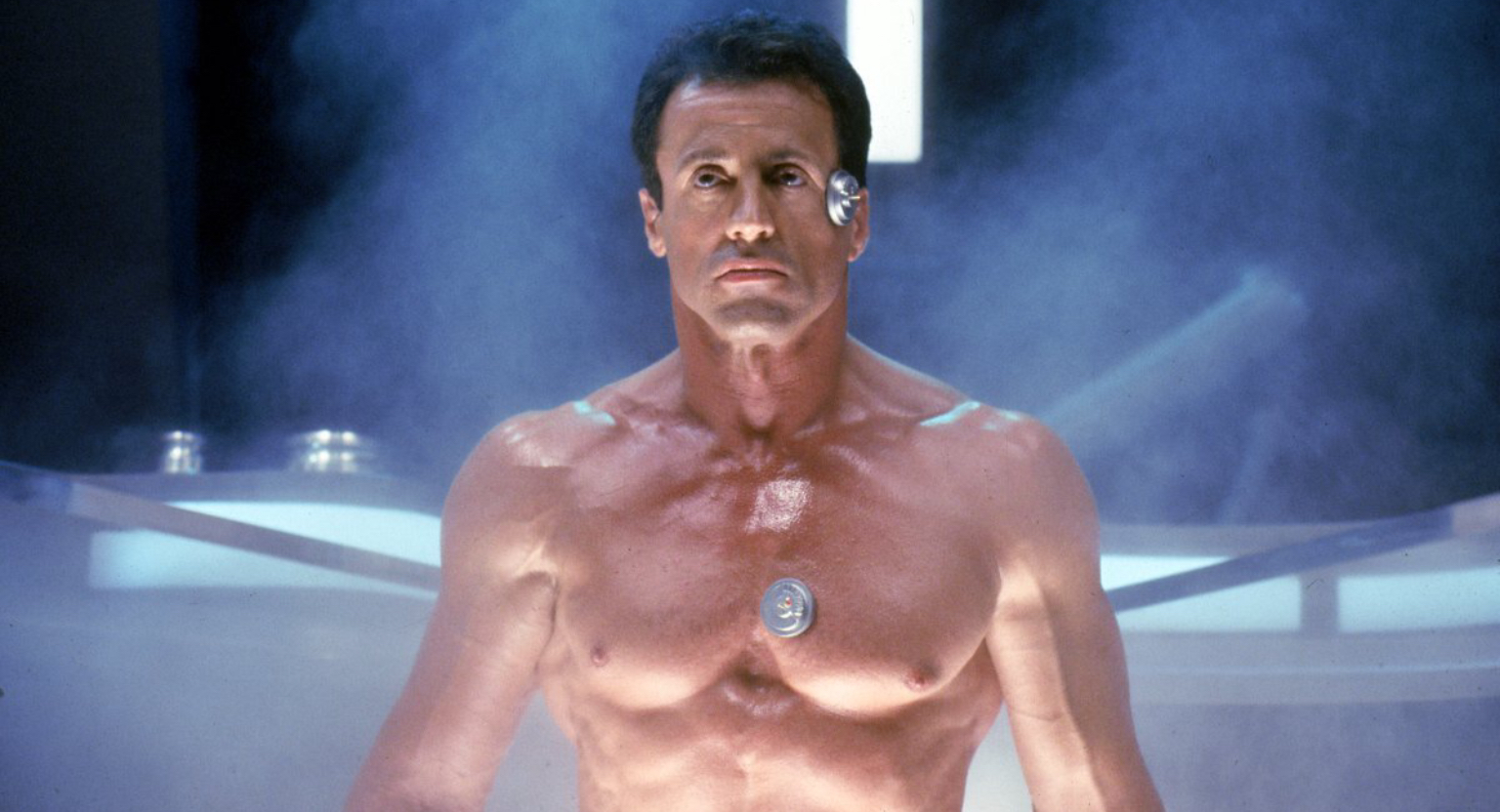
The twist in the tale is that Phoenix is revealed to be nothing more than a pawn in the plans of the Mayor/Governor of San Angeles, the nefarious Dr Raymond Cocteau (Nigel Hawthorne), who has ensured that Phoenix received the skills upgrade required to make him an even more efficient agent of chaos, as well as brainwashing him into killing Edgar Friendly (Denis Leary), leader of an unground resistance movement whose main aim is to be able to feed themselves, having being forced to live in the sewers below the Utopia above. The resistance group, known as The Scraps, are simply not accepted by Cocteau who feels that they don’t belong in his perfect world and he’s willing to do anything to get rid of them, but can he really control a man like Simon Phoenix?
Whilst having initially been brought into the future as a patsy in Cocteau’s scheme, John Spartan is more than the prehistoric wrecking machine both his nickname would suggest and his futuristic colleagues initially believe him to be and he’s quickly on the trail of Phoenix, looking to expose the reasons behind his “escape”.
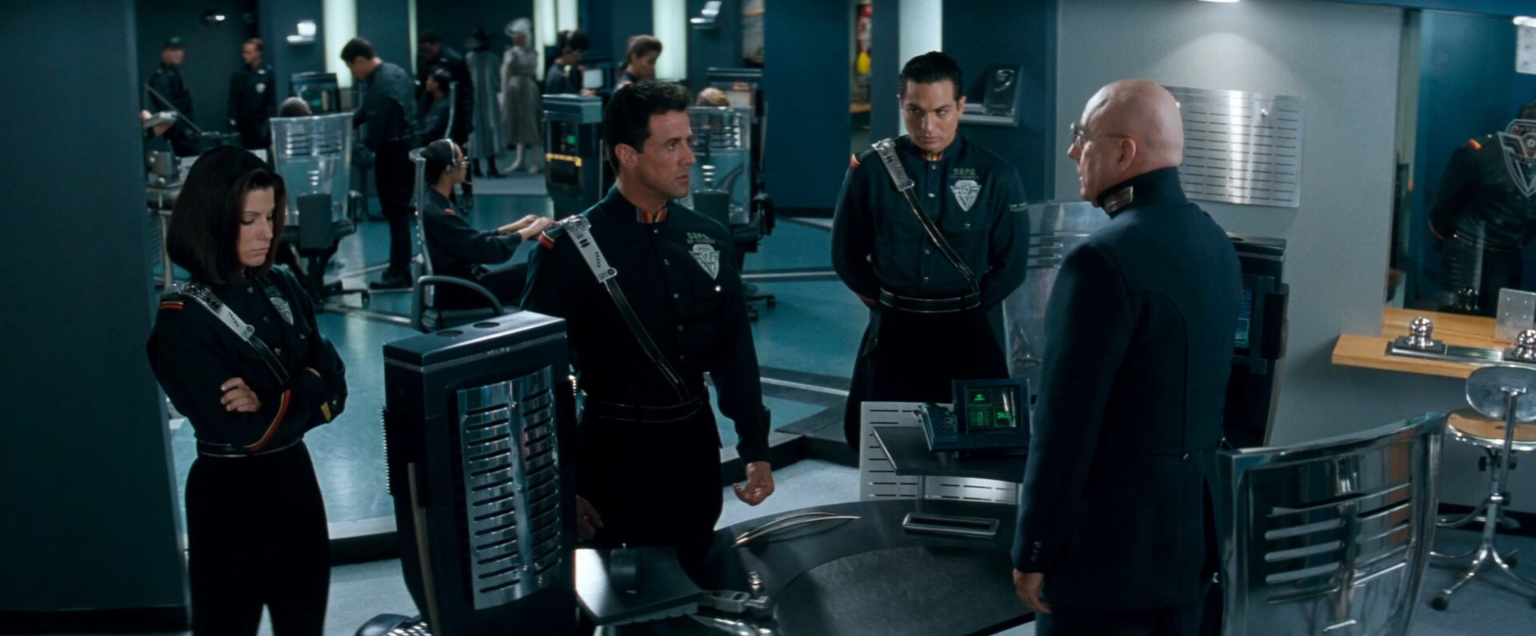
At 47 years old Sylvester Stallone showed that there was plenty of life left in his action man persona with a frenetic and boldly physical performance. Another thing that is often overlooked is that although he’d previously failed in the comedic stakes in the two preceding years with his turns in Oscar (1991) & the cringeworthy Stop! Or My Mom Will Shoot! (1992), Demolition Man would see him inject a wry and knowing sense of fun and almost self mockery without ever straying into the realms of parody. Most of the laughs come from Stallone’s fish out of water reactions to this odd future and his character’s snappy responses to the absurdity of it all.
Snipes is clearly having a whale of a time as the colourfully psychotic Simon Phoenix. Chewing the scenery doesn’t do his performance justice. Snipes not only chews it, he applies a thick layer of BBQ sauce and chomps down with the over zealous appetite of a man at the end of a hunger strike and yet, as over the top as his performance is, it works perfectly. Phoenix is suitably balanced somewhere between DC Comic’s The Joker and a wisecracking, Kung-fu kicking psychopath of his own design.
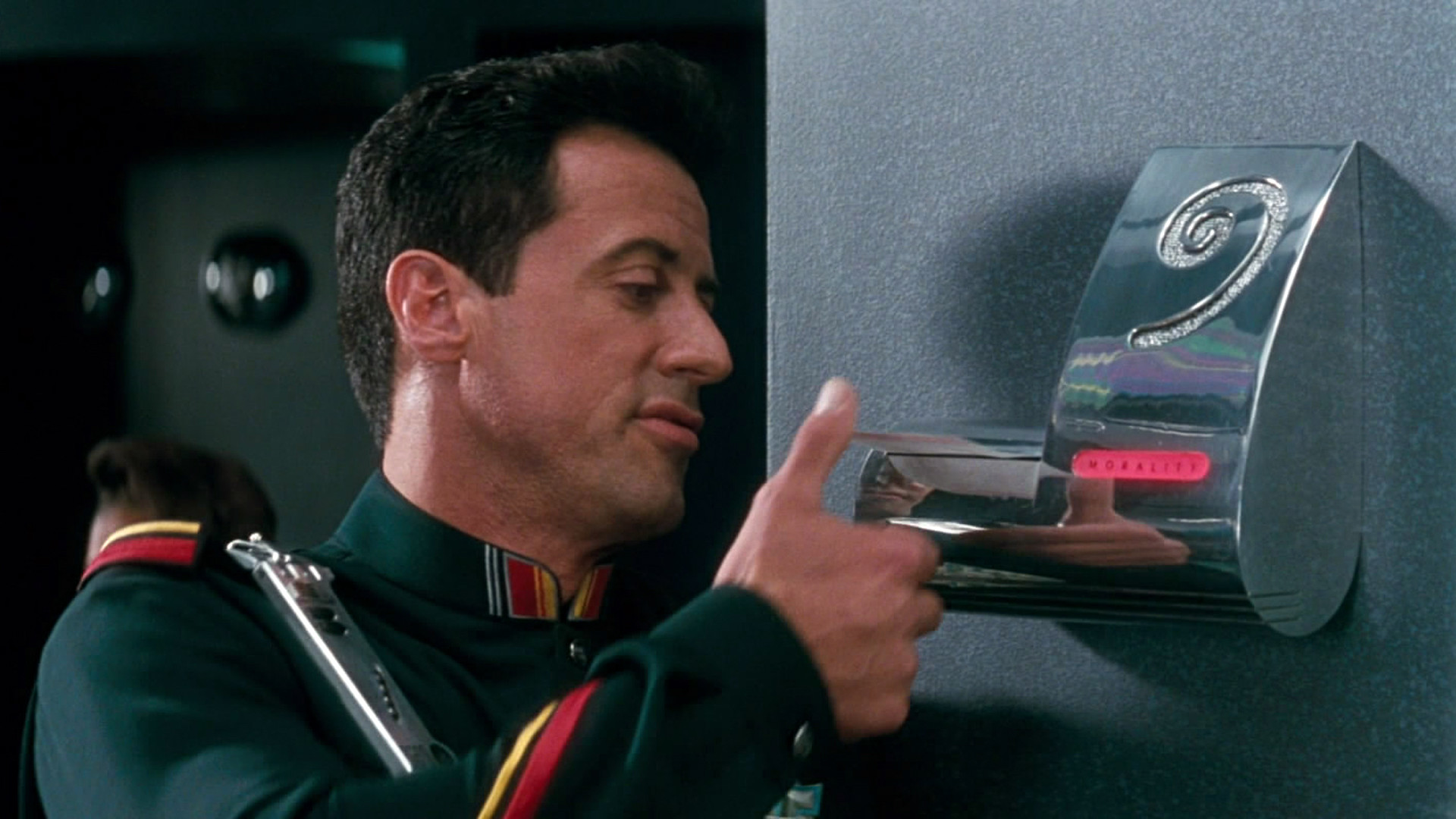
Whilst Demolition Man was Sandra Bullock’s springboard to greater things, her true breakthrough would come the following year with her role as the impromptu bus driver Annie opposite Keanu Reeves in Speed. Still, there’s no denying that her presence here is just as important as a conduit between this absurdly sterile future and the brutal past from which Spartan and Phoenix hail, a past for which she has more than a passing interest. Her effervescent character and naivety, coupled with her curiosity for adrenaline-filled adventure is played perfectly. Her distinctive tone and mannerisms fit perfectly and she carefully treads the very thin line between charmingly excitable and annoying without really ever becoming the latter. This is even more interesting when you consider that she was a last minute replacement for the role of Huxley. Stepping in in place of Lori Petty, who left the production after a few days of filming due to the oft-cited reason of “creative differences” Bullock does a commendable job here and one can’t help but be won over by her charm.
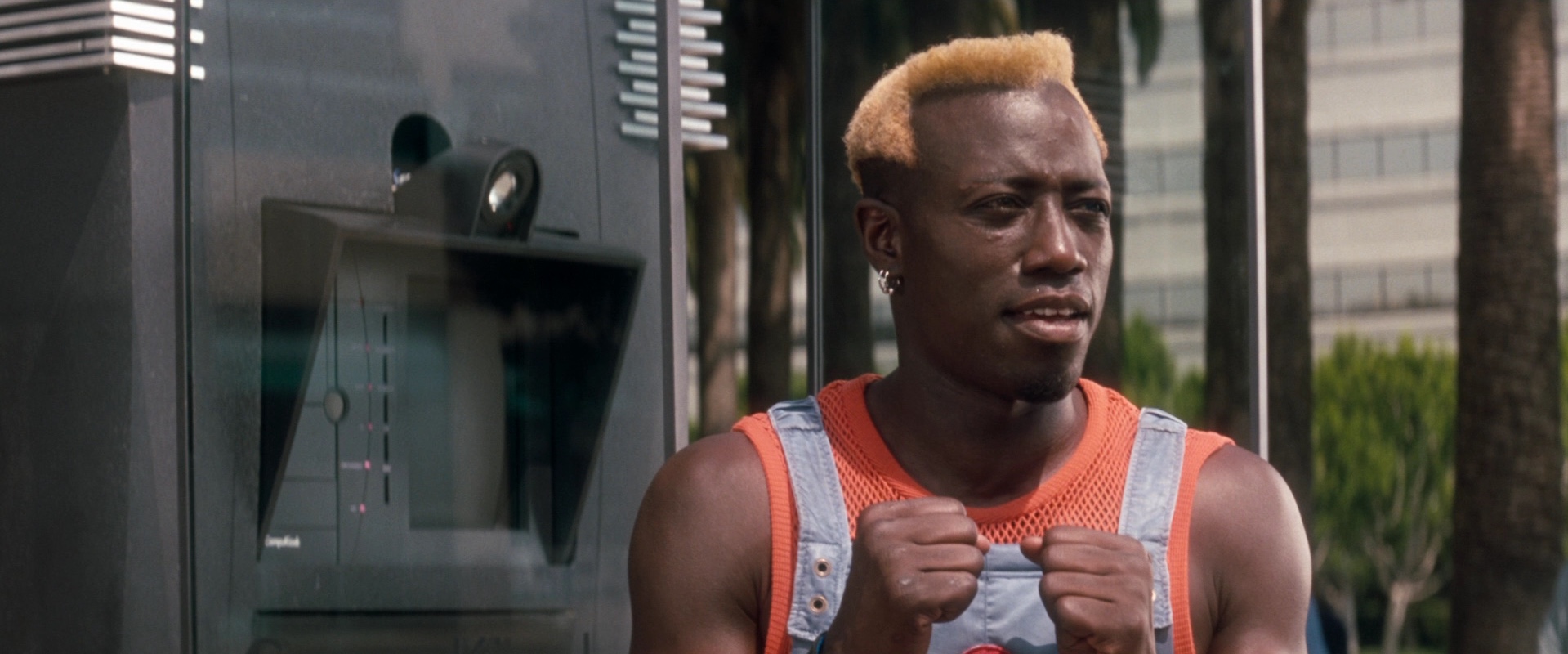
Demolition Man may never be considered a classic but as time goes on, the story of John Spartan’s adventures in this neutered, family-friendly future stands up remarkably well and actually feels uncomfortably relevant and was probably more than a little ahead of its time. Simon Phoenix says at one point, “I’m sorry to say that the world has become a pussy-whipped, Brady Bunch version of itself, run by a bunch of robed sissies.”
Phoenix’s rather blunt summarisation is perhaps even more relevant in today’s social media driven culture, where certain factions of society require their safe spaces and will jump at the chance to display their public outcry at the most minor slight against something they suppose to hold dear, directing their outrage at a simple tweet for its lack of sensitivity to a group that they perhaps don’t even belong to or care for. The “Social Justice Warrior” and so called “Snow Flakes” of this world were parodied in Demolition Man long before they even existed.
Yes, we can and all should try our best to make the world a better, more tolerant and fair place, but to err is human and surely we mustn’t allow ourselves to become too soft and easily offended. The simple fact is that we will probably always need people like John Spartan because there will more than likely always be a Simon Phoenix or a Raymond Cocteau waiting in the wings to spread chaos and destruction if we don’t.
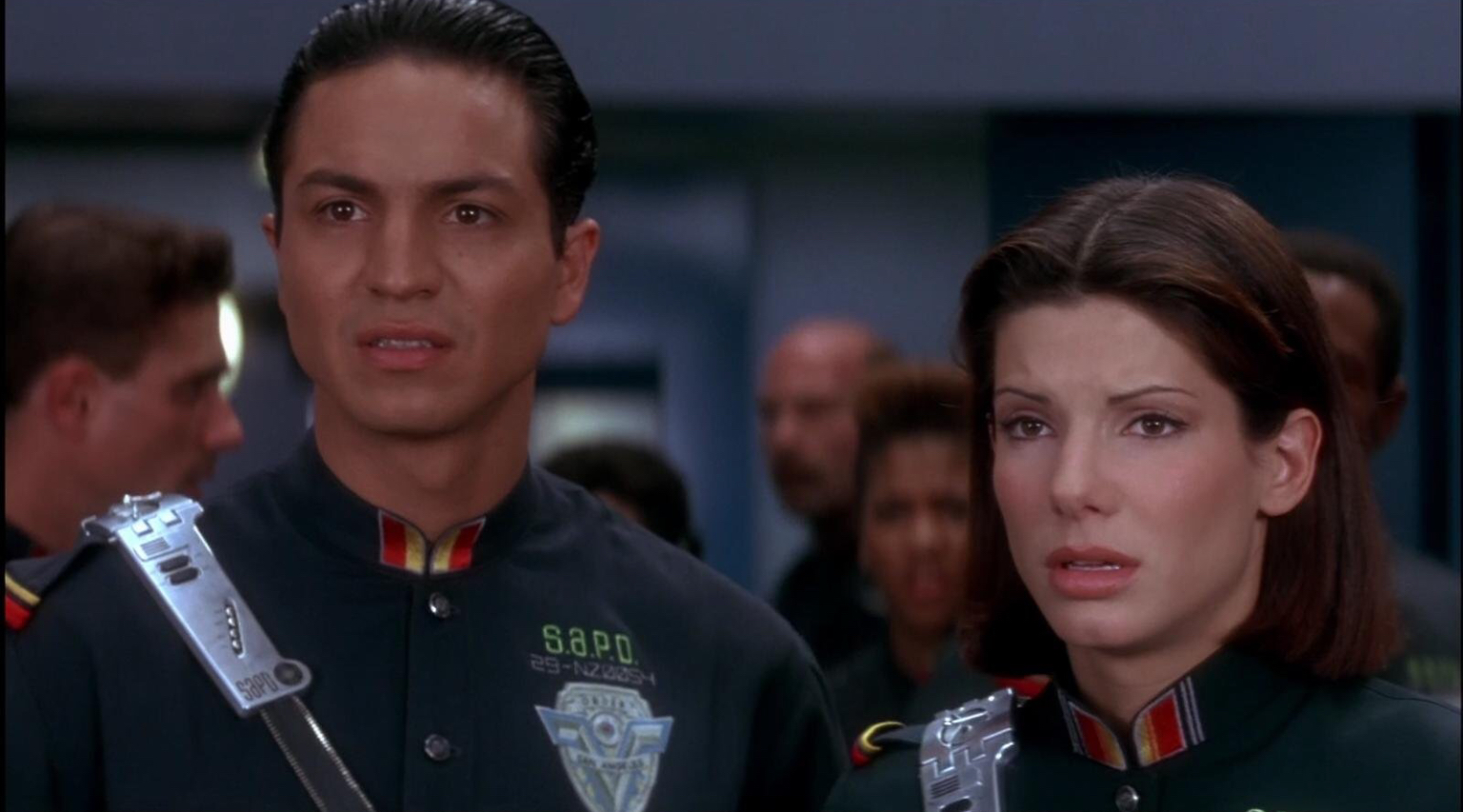
Demolition Man, whilst incredibly silly fun, is also a classic example of how art and entertainment can often predict the future, or a possible future at least. Just take this little excerpt as an example…
Huxley: “I have, in fact, perused some newsreels in the Schwarzenegger Library, and the time that you took that car…”
Spartan: “Hold it. The Schwarzenegger Library?”
Huxley: “Yes. The Schwarzenegger Presidential Library. Wasn’t he an actor when you…?”
Spartan: “Stop! He was President?”
Huxley: “Yes! Even though he was not born in this country, his popularity at the time caused the 61st Amendment which states…”
Spartan: “I don’t wanna know. President?”
Surely a man couldn’t become President based solely on the cult of personality? No, I’m sure something like that could never happen, right?
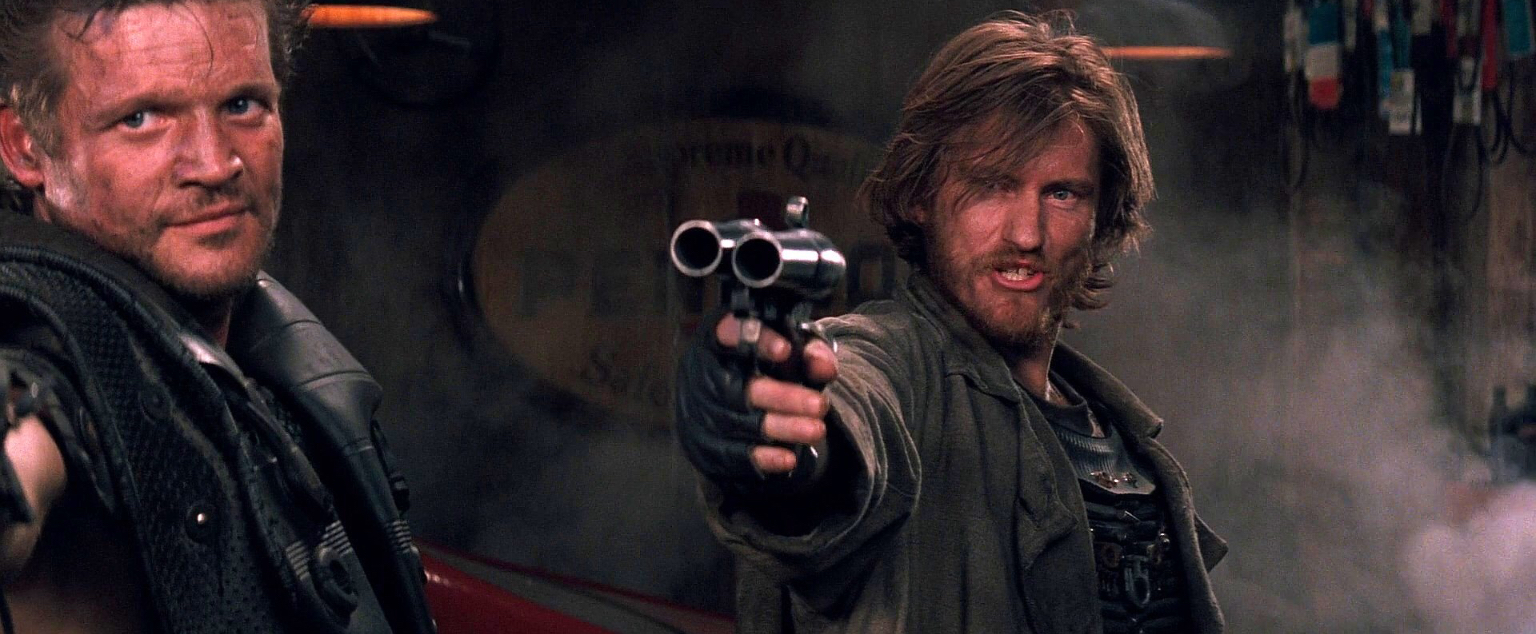
On top of this, the general culture in the developed world is fast starting to show the signs of the same domineering censorship in the name of so called progression that was seen in Demolition Man a quarter of a century ago. Google and YouTube both monitor their user’s submissions deciding what videos and articles should be flagged or even removed for using so called “hate speech”. Debates and discussions can be shut down on college campuses if they are deemed to be too right wing or not acceptable to the particular ruling socio-political angenda. Meanwhile millions living in “First World” countries are relying on food banks to feed their families whilst their distant fellow humans fiercely and endlessly debate culturally acceptable social media diplomacy and inappropriate conduct from behind the safety of their hi-tech smartphones and tablets.
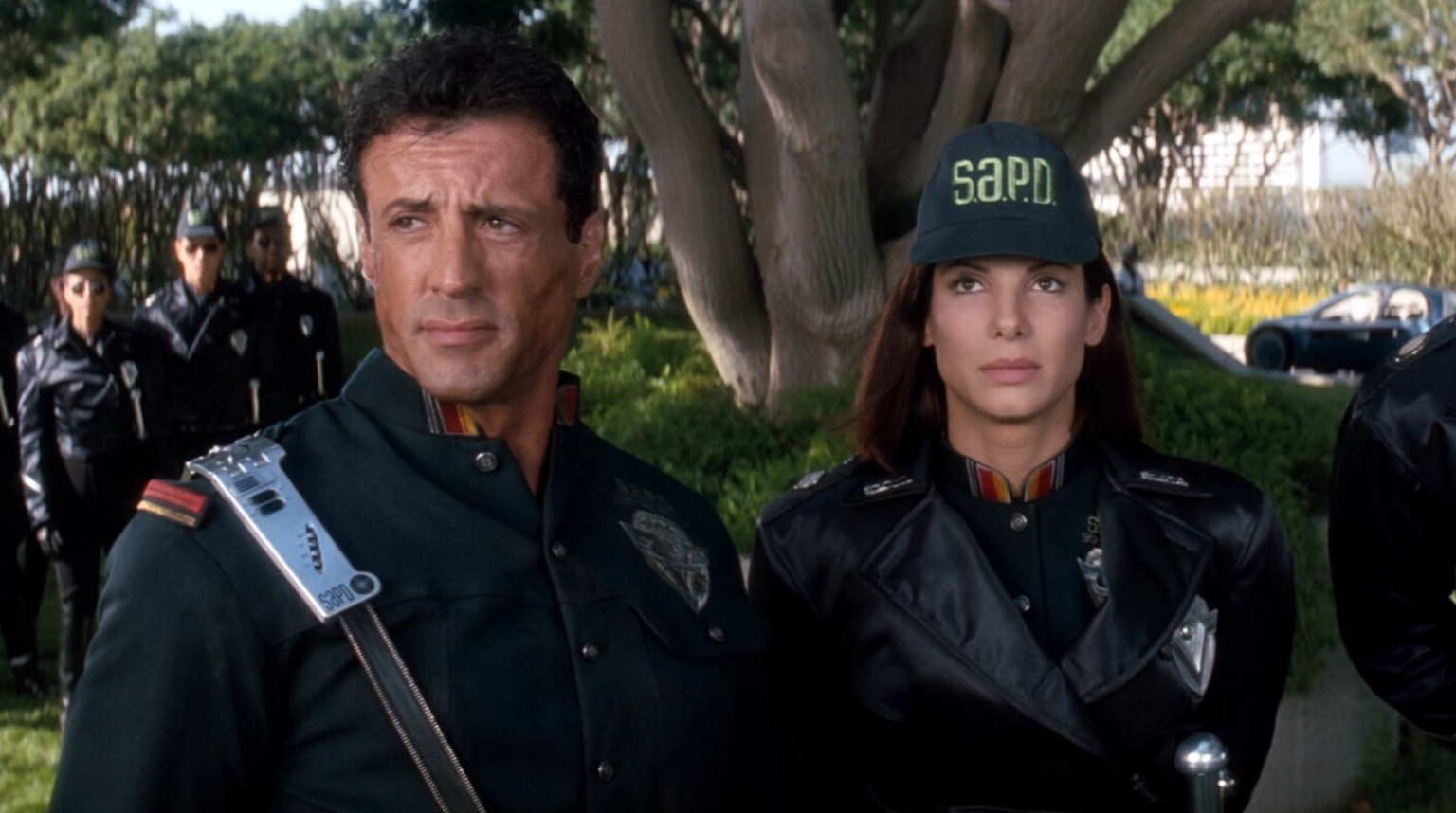
Maybe I’m overthinking all of this and need to “enhance my calm”. Either way, Demolition Man is a hugely enjoyable slice of action-science-fiction with a brilliantly realised future world that looks gorgeous, is perfectly enhanced by Elliot Goldenthal’s dreamily ethereal score and has what is, for the most part, a sharply witty script and some great action. Yes, some of the dialogue is more than a little cringe inducing in places and it still very much carries with it some of the action film cliches from Stallone’s ‘80s output but given its heritage, it’s a far smarter film than many of it’s forbears. It was a film that seemed for the longest time to lean more towards comedy than actual real-world social commentary and satire. As time goes on it’s a film that seems ever more relevant and prescient and may act as a warning to all those who don’t want to end up tiptoeing around in robes as they make their way to Taco Bell listening to endless TV ad jingles and cleaning their posteriors with the three seashells. I never did figure out how they worked.
Film ‘89 Verdict – 7/10

